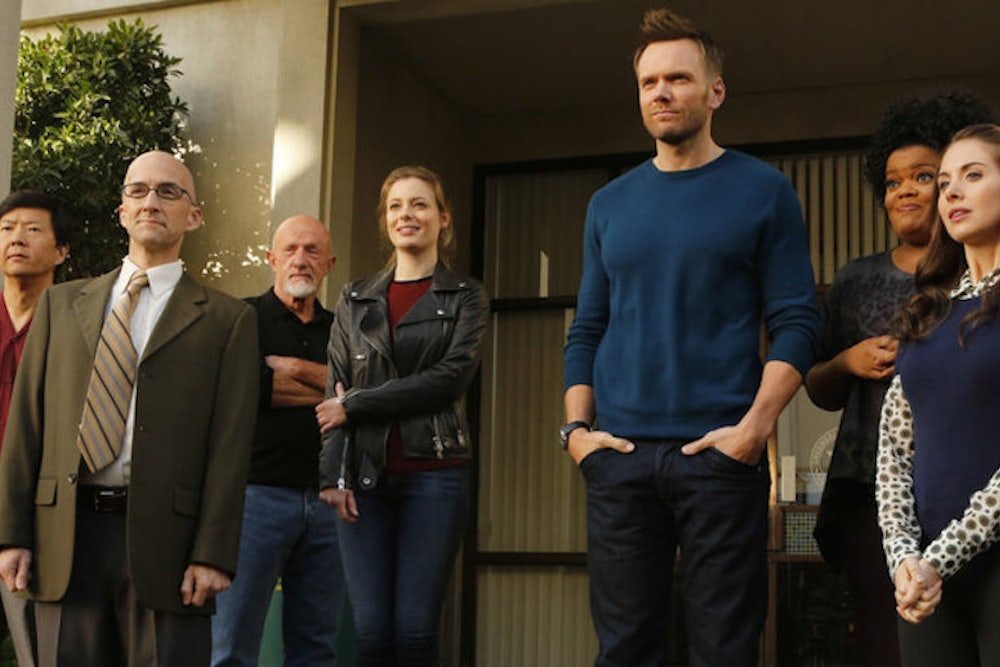When “Community” airs 13 new episodes on Yahoo next fall, it may be the first season of television to owe its existence largely to a hashtag. “#sixseasonsandamovie” grew out of a throwaway gag in a second season episode of the cult comedy, in which one character insisted that the short-lived NBC show “The Cape” would last that long. It was a self-aware joke about delusional fandom, built around the absurd idea that anyone would actually love “The Cape.” But it soon became an online rallying cry for fans campaigning against cancellation. The much-loved, little-watched sitcom clung to life for five years at NBC—the network first placed it on hiatus, then replaced its mercurial showrunner Dan Harmon, then reinstated Harmon one year later. When NBC finally cancelled “Community” this May, the unorthodox show had, against all odds, almost completed its fifth season. But the fans kept tweeting, and the producers kept shopping it around (Netflix and Hulu both said no), and last night, at the eleventh hour, Yahoo came to the rescue, ordering 13 episodes that will air in weekly installments.
As a longtime “Community” fan, I should have been glad. Mostly, though, I felt tired. We live in an age of resurrection, at least as far as television is concerned. “Veronica Mars,” “Arrested Development,” “Family Guy”—nothing is dead as long as there are people willing to tweet for its return. “Community” is valuable to Yahoo because it has a devoted, outspoken audience that will follow it anywhere, even to a search engine. This is just the latest entry in the ongoing Kickstarter-ization of popular entertainment. (NPR’s Linda Holmes has called it “the Age of Enthusiasm.”) It makes sense as a business decision, but this phenomenon—the artificial resuscitation of art that doesn’t need resuscitating—is worrying. What does the increasing influence of online fandom on TV production mean when fans invest their energies in reviving old shows instead of supporting new ones?
Of course, there’s nothing new about Hollywood producing movies and television solely to satisfy a built-in audience; all the comic-book sequels in theaters right now attest to that. In 1903, Arthur Conan Doyle succumbed to public pressure—fans had created “Keep Holmes Alive” clubs—and revived Sherlock Holmes, publishing new stories under the excuse that the detective had only appeared to plunge to his death ten years earlier. Perhaps it’s better for creators to feel beholden to passionate viewers sitting at home than to corporate suits. But the effect is often the same: TV shows continuing on long after they’ve lost energy and purpose. One of the great innovations of this so-called Golden Age of television was supposed to be shows that ended when they were ready. “Breaking Bad” wasn’t dragged out for ten seasons; neither was “Lost.” Matthew Weiner has stuck to his stated end date for “Mad Men,” give or take a split season. “The Office” limped through nine seasons because NBC was afraid they needed it to anchor their sitcom lineup. (They were right.) But when networks aren’t artificially stretching a show’s lifespan, fans are now ready to do the same.
“I’m not going to be the guy that re-cancels cancelled Community,” Harmon wrote on his personal Tumblr in May, after admitting that he felt pretty “lukewarm” about continuing the show somewhere else. But not wanting to piss off your fans is a shoddy reason to write a TV show. In its fifth season, “Community” kept circling back to concepts that had worked for it before: another animated episode, more Dungeons and Dragons. It was rarely bad, and intermittently brilliant, but Harmon seemed to have little else to say.
Sure, an NBC-less season may reinvigorate the show. But I suspect that, without the limits of network television, Harmon’s genius may run amok. Just like “Arrested Development” benefited from episodes that couldn’t extend past 23 minutes—and struggled when it was untethered from that limit on Netflix—“Community” may shine because of the tension between Harmon’s wild imagination and the constraints of a network sitcom. For Yahoo, Harmon can write episodes that last 21 minutes or 38. He can continue the same type of pop-culture homage, or experiment with new narrative forms. He could write an episode that synchs up with “Dark Side of the Moon.” A classic “Community” episode creates something new out of strict genre conventions—action movie, Ken Burns documentary, my Dinner with Andre. To be successful, Harmon may need to be similarly reined in.
Not to mention, the stars of “Community” may be itching for something new. Gillian Jacobs has already signed up for a Judd Apatow-directed comedy for Hulu. John Oliver is busy lecturing us about world politics each Sunday night. Even Dan Harmon is working on something fresh, the well received animated cartoon “Rick and Morty.” They’ve begun to move on from “Community,” even if the show’s fans haven’t. But brilliant shows end all the time—and, if we’re lucky, they’re creators go on to create more art. “Freaks and Geeks” died too soon, but from its ashes we got “Undeclared,” The 40-Year-Old Virgin, Bridesmaids, and the continuing performance art that is James Franco’s existence. “Sports Night” gave us “The West Wing.” Maybe it’s time to let go.
